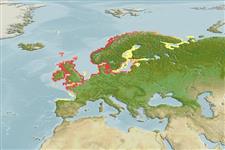分类 / Names
俗名 | 同种异名 | Catalog of Fishes(属, 种) | ITIS | CoL | WoRMS | Cloffa
Environment: milieu / climate zone / depth range / distribution range
生态学
海洋; 半咸淡水 底中水层性; 非迁移的; 深度上下限 1 - 6 m (Ref. 130221). 溫帶; 71°N - 43°N, 11°W - 55°E
Northeast Atlantic: north-western Europe.
東北大西洋: 歐洲西北方。
大小 / 重量 / 年龄
Maturity: Lm ? range ? - ? cm
Max length : 22.0 cm SL 雄鱼/尚未辨别雌雄; (Ref. 4119)
背棘 (总数) : 14 - 17. Front of body brassy-yellow in the male, with larger pectoral fins than in the female (Ref. 35388).
身体的前面黄铜色-黄色的在雄鱼中, 有较大的胸鳍超过在母鱼中.(参考文献 35388)
Adults live solitary or in pairs in weedy, shallow coastal areas (Ref. 4119). Feed on small invertebrates (Ref. 4119). Males build a nest from algae and debris, using kidney excrete as glue. Spawning season is May to June. Females deposit 150 - 200 eggs in the nest and often die shortly afterwards (Ref. 9900). Males care for and defend the nest. Offsprings reach maturity in one year (Ref. 4645).
各别地住或成对在杂草丛生又水浅的沿岸海洋中.(参考文献 4119) 吃小型无脊椎动物。 (参考文献 4119) 雄鱼建立一个巢,而且母鱼在在哪里产下卵之后不久即死亡。 (参考文献 9900)
Males build, guard and aerate the nest where the eggs are deposited (Ref. 205). Also Ref. 53335.東北大西洋: 歐洲西北方。
Muus, B.J. and P. Dahlström, 1974. Collins guide to the sea fishes of Britain and North-Western Europe. Collins, London, UK. 244 p. (Ref. 173)
人类利用
渔业: 没有兴趣
工具
特别资料
下载 XML
网络资源
Estimates based on models
Preferred temperature (Ref.
123201): 7.5 - 12.5, mean 9.9 °C (based on 512 cells).
Phylogenetic diversity index (Ref.
82804): PD
50 = 1.0000 [Uniqueness, from 0.5 = low to 2.0 = high].
Bayesian length-weight: a=0.00468 (0.00205 - 0.01068), b=3.04 (2.83 - 3.25), in cm total length, based on LWR estimates for this (Sub)family-body shape (Ref.
93245).
营养阶层 (Ref.
69278): 3.5 ±0.37 se; based on food items.
回复力 (Ref.
120179): 高度, 族群倍增时间少于 15个月 (K=1.78; tm=1).
Fishing Vulnerability (Ref.
59153): Low vulnerability (17 of 100).
Nutrients (Ref.
124155): Calcium = 35 [8, 105] mg/100g; Iron = 0.37 [0.14, 1.25] mg/100g; Protein = 2.67 [0.00, 6.47] %; Omega3 = 0.522 [0.226, 1.292] g/100g; Selenium = 9.45 [1.54, 29.35] μg/100g; VitaminA = 19.8 [6.0, 61.4] μg/100g; Zinc = 0.842 [0.413, 1.601] mg/100g (wet weight);
